The foreign relations of Afghanistan are in a transitional phase since the 2021 fall of Kabul to the Taliban and the collapse of the internationally-recognized Islamic Republic of Afghanistan. No country has recognised the new regime, the Islamic Emirate of Afghanistan. Although some countries have engaged in informal diplomatic contact with the Islamic Emirate, formal relations remain limited to representatives of the Islamic Republic.

Relations between Afghanistan and the United States began in 1921 under the leaderships of King Amanullah Khan and President Warren G. Harding, respectively. The first contact between the two nations occurred further back in the 1830s when the first recorded person from the United States explored Afghanistan. The United States government foreign aid program provided about $500 million in aid for economic development; the aid ended before the 1978 Saur Revolution. The Soviet invasion of Afghanistan in 1979 was a turning point in the Cold War, when the United States started to financially support the Afghan resistance. The country, under both the Carter and Reagan administrations committed $3 billion dollars in financial and diplomatic support and along with Pakistan also rendering critical support to the anti-Soviet Mujahideen forces. Beginning in 1980, the United States began admitting thousands of Afghan refugees for resettlement, and provided money and weapons to the Mujahideen through Pakistan's Inter-Services Intelligence (ISI). The USSR withdrew its troops in 1989.
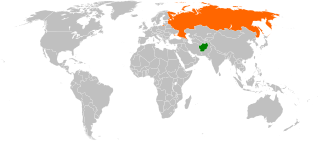
Relations between Afghanistan and Russia first emerged in the 19th century. At the time they were placed in the context of "The Great Game", Russian–British confrontations over Afghanistan from 1840 to 1907. The Soviet Union was the first country to establish diplomatic relations with Afghanistan following the Third Anglo-Afghan War in 1919. On 28 February 1921, Afghanistan and the Soviet Russia signed a Friendship Treaty. The Soviet Union intervened in Afghanistan against the Basmachi movement in 1929 and 1930.

Afghanistan–India relations are the diplomatic relations between India and Afghanistan. They had been historical neighbors when India was under colonial rule and have since shared cultural ties through Bollywood and cricket.
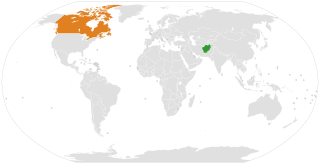
Afghanistan and Canada established diplomatic relations in 1968. In 2003, Canada opened its embassy in Kabul and appointed its first resident ambassador. Afghanistan appointed its first resident ambassador to Canada in 2002. In August 2021, Canada closed its embassy in Kabul with the return of the Taliban to power in Afghanistan.
The Embassy of Canada in Afghanistan was the diplomatic mission of the Canadian government located in the Afghan capital city of Kabul. It was responsible for bilateral relations between Canada and Afghanistan. Diplomatic relations between the two countries were re-established on September 5, 2003. The relations were suspended in light of the fall of Kabul, and the Taliban takeover. The most recent Ambassador was Reid Sirrs.

Diplomatic relations between Afghanistan and China were established in the 18th century, when Afghanistan was ruled by Ahmad Shah Durrani and China by Qianlong. But trade relations between these nations date back to at least the Han dynasty with the profitable Silk Road. Presently, China has an embassy in Kabul and Afghanistan has one in Beijing. The two countries share a 92 km (57 mi) border.
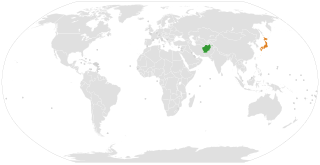
Diplomatic relations between Afghanistan and Japan were officially established in 1931, although early contacts date back to 1907 when the Afghan general Ayub Khan, who defeated the British in the Battle of Maiwand, visited Japan.

The Embassy of the Islamic Republic of Afghanistan in Washington, D.C. was the primary diplomatic mission of the Islamic Republic of Afghanistan to the United States. The building is located at 2341 Wyoming Avenue N.W. in Washington, D.C.'s Kalorama neighborhood. The chancery is built in the Colonial Revival style.

The Embassy of the United States of America in Kabul was the official diplomatic mission of the United States of America to the Islamic Republic of Afghanistan. The embassy was housed in a chancery located on Great Massoud Road in the Wazir Akbar Khan neighborhood of the Afghan capital, Kabul, and was built at a cost of nearly $800 million. On August 15, 2021, in the face of a Taliban advance on Kabul, embassy staff relocated to makeshift but secure facilities at Hamid Karzai International Airport. Kabul fell and the chancery building officially closed late August 15th.

Afghanistan–Denmark relations refer to diplomatic ties between Afghanistan and Denmark. Afghanistan is represented in Denmark through its embassy in Oslo, Norway. Denmark used to have an embassy in Kabul until it was closed in 2021 due to the Taliban takeover of Afghanistan, that has not been recognized by any state in the world. Denmark has 760 soldiers in Afghanistan, operating without caveat and concentrated in Helmand Province. Relations between the two countries are friendly. About 9,578 Afghans live in Denmark.

Afghanistan and Indonesia established diplomatic relations on 20 May 1950. The relationship is mostly founded on common religious solidarity, as Indonesia is the world's most populous Muslim majority country, and Afghanistan is also a Muslim-majority country. Indonesia has expressed its commitment to support and assist the rebuilding of Post-Taliban Afghanistan in various sectors, including technical training, infrastructure, women's empowerment, higher education, and diplomat training. Indonesia has an embassy in Kabul, while Afghanistan has an embassy in Jakarta. Both nations are full members of Non-Aligned Movement and Organisation of Islamic Cooperation.
The Embassy of the United Kingdom in Kabul was the United Kingdom's diplomatic mission to Afghanistan. The British first established a diplomatic mission, a legation, in 1922 after the Anglo-Afghan Treaty of 1919. The Viceroy of India George Curzon, 1st Marquess Curzon of Kedleston ordered that a large and opulent compound be constructed and this was completed in 1927. The legation was withdrawn in the Kabul Airlift as a result of the 1928-29 civil war but was re-established in 1930. The legation became an embassy in 1948 but this was withdrawn in 1989 following the Soviet withdrawal from Afghanistan. The embassy compound was handed over to Pakistan in 1994. Following the 2001 United States invasion of Afghanistan an embassy was re-established at a new site in the Wazir Akbar Khan District. The embassy, on the edge of Kabul's secure zone, was considered vulnerable to attack in 2018 and consideration was given to a new site, but did not proceed. Following the start of the 2021 withdrawal of foreign troops from Afghanistan there has been speculation that the embassy might close.
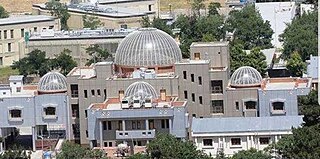
The Embassy of India in Kabul is the diplomatic mission of the Republic of India to Afghanistan. The current Ambassador is Rudrendra Tandon.

On 15 August 2021, Afghanistan's capital city of Kabul was captured by the Taliban after a major insurgent offensive that began in May 2021. It was the final action of the War in Afghanistan, and marked a total victory for the Taliban. This led to the overthrowing of the Islamic Republic of Afghanistan under President Ashraf Ghani and the reinstatement of the Islamic Emirate of Afghanistan under the control of the Taliban.
On 15 August 2021, the city of Kabul, the capital of the Islamic Republic of Afghanistan, was captured by Taliban forces during the 2021 Taliban offensive, concluding the War in Afghanistan that began in 2001. The fall of Kabul provoked a range of reactions across the globe, including debates on whether to recognize the Taliban as the government of Afghanistan, on the humanitarian situation in the country, on the outcome of the War, and the role of military interventionism in world affairs.

The Taliban has ruled Afghanistan as the Islamic Emirate of Afghanistan since taking control by force in 2021, overthrowing the internationally recognized Islamic Republic of Afghanistan. The takeover was widely criticized by the international community, and no countries have extended diplomatic recognition to the new regime, despite nominally maintaining relations with Afghanistan. The Taliban has campaigned for international recognition since the takeover. Several countries have vowed never to recognize the Islamic Emirate, and others have said they will do so only if human rights in the country are respected. Some countries have accredited Taliban diplomats at the chargé d'affaires level despite not recognizing the Islamic Emirate. In September 2023, China became the first country to formally name a new ambassador to the country since the takeover, and in January 2024 recognized the Taliban's envoy to China; however, China still does not formally recognize the Taliban.

Afghanistan–Italy relations are the diplomatic relations between Afghanistan and Italy which were formed in 1919. On June 3, 1921, they signed the agreement for the exchange of permanent Diplomatic mission and the centenary, on 2021, was celebrated with letters exchanged between their Chairs. Both nations are members of the United Nations but the new Taliban rulers of Afghanistan are not recognised as a valid government by them, or indeed any state so far.
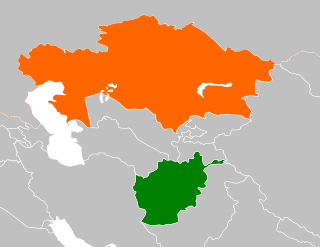
Relations between Afghanistan and Kazakhstan began in 1992.

















